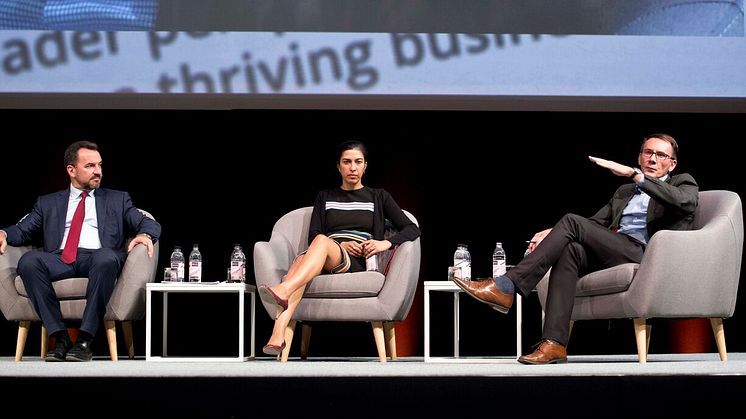
News -
Global investment strategies and the state of the South African market
In a panel discussion on the state of the South African Market at the 2017 Discovery Financial Planning Summit, moderated by Vusi Thembekwayo, Etienne le Roux, Chief Economist at Rand Merchant Bank (RMB), noted that although some recovery has been predicted in South Africa’s growth (at 1 to 1.5% in 2018), in terms of per capita income growth, it’s going nowhere.
Growth remains subdued on the back of lower consumer spending, which is under pressure, and low business confidence, resulting in corporates not investing.
With inflation having peaked and food inflation in particular coming down, Le Roux pointed out that interest rates should, however, move down at some point, barring another external or domestic shock.
Le Roux pointed out that South Africa now holds the dubious honour of having the world’s most volatile currency, so one needs to be brave to make currency forecasts and RMB’s trading ranges are quite wide – from R12 to R15.
“It’s not much of a forecast, but it gives you an idea of where the risks sit,” he said. The R15 scenario would be on the back of South Africa’s credit rating being downgraded again, whereas the R12 scenario is if global improvements continue, local developments are positive too, and more capital flows into the country.
Goldman Sachs bullish on SA – suggests emergency economic recovery plan
Colin Coleman, Head of Investment Banking for Sub-Saharan Africa at Goldman Sachs, said that against a positive global backdrop, South Africa has the propensity to rally.
“The analyst median growth expectations for 2017 in South Africa are around 1%,” he said. “Goldman Sachs actually has quite a bullish forecast, based on global rebalancing and commodity price stability, of around 1.5% for 2017, and markets have largely priced in a ratings downgrade. We actually think disinflation expectations are market supportive. In particular, Goldman Sachs expects 50 basis points in cuts in interest rates from the SARB in the next 12 months.”
Coleman said the upside on a “Zexit” or a Zuma exit, (based on his presidency coming to an end), should bring about a rally of closer to R11.50 to the dollar than the current R13.
On the downside, however, if both Standard & Poor’s and Moody’s cut the local currency rating to sub-investment grade and South Africa exits the Citibank World Government Bond Index, the country will lose somewhere around $7 to $10 billion of index-related funds, which will be forced to leave the country. The Rand will, over time, move more towards R14 to the dollar.
Coleman believes the ANC elective conference at the end of the year will be a binary moment for the country. “The choice that the ANC is going to make will have a large effect on the country, between a continued patronage state versus a constitutional democracy and a modern market economy,” he said. “This, we think, will bring about two decades of upside or downside to follow.”
South Africa’s people have always had a tendency to confound sceptics, Coleman notes. He believes the biggest opportunity is to put its eight million unemployed people to work. “That is a priority for everyone,” he said. “For that to happen, pro-business policies are a pre-condition. We cannot have pro-poor policies with an anti-business agenda. To achieve this, we have to follow an inclusive growth agenda… We have to work out structural reforms to get there.”
His opinion is that South Africa needs to consider an emergency economic recovery plan within the next six months, which will require partnership between business, government and labour, but on a “team” basis. Defeating state capture, he concluded, is a necessary first step.”
What happens when foreign funding runs out?
Nazmeera Moola, Economist and Strategist at Investec Asset Management, said she is worried about weak growth.
“I’m now expecting growth to be under a percent,” she said. “The only reason we have growth at all is because of strong commodity prices and a strong agricultural harvest.”
If, Moola said, growth was dependent on local factors alone, we’d be in recession. Weaker growth will result in lower tax collections. Government then needs to borrow more, which eventually results in higher borrowing costs.
At the same time, she said, state-owned entities (SOEs) are not currently able to borrow in the local bond market – another worrying sign. As an example, she cites recent bond auctions by TransNet, which raised R10 to R25 million, whereas prior to the cabinet reshuffle, they might have raised R250 million.
Private companies, on the other hand, find their auctions oversubscribed. “Foreign investors are funding the government. They don’t play in the state-owned company market much. State-owned companies are dependent on local funders. And local investors are not lending them money. That’s the risk,” she says.
An international view
Isabelle Mateos y Lago, Chief Multi-Asset Strategist at BlackRock, echoed a theme of positivity that emerged during the morning sessions of the Discovery Financial Planning Summit.
“We think today’s global market environment is one of the most positive we’ve seen since the global financial crisis,” she said. “Why is that? Well, because we’re in an environment of global reflation.”
BlackRock defines reflation as a virtuous cycle of higher economic growth, income and prices. While reflation was previously limited to the US, the rest of the world is now catching up, while the US is stabilising.
Mateos y Lago acknowledged that the world is still facing deep structural challenges, including political uncertainty, but says that by making smart investment decisions, there are good returns available. She said BlackRock believes that market consensus around growth is currently too pessimistic.
The good news, she says, is that if you’re willing to take more risk, you can get better returns. “You’re getting paid to take risk, which is an important message in today’s environment.”
In the current market environment, she noted, because basic returns are so low, it makes it even more important to take somewhat more risk than one is instinctively comfortable with.






